King’s Tale: An Oral History of Peter King
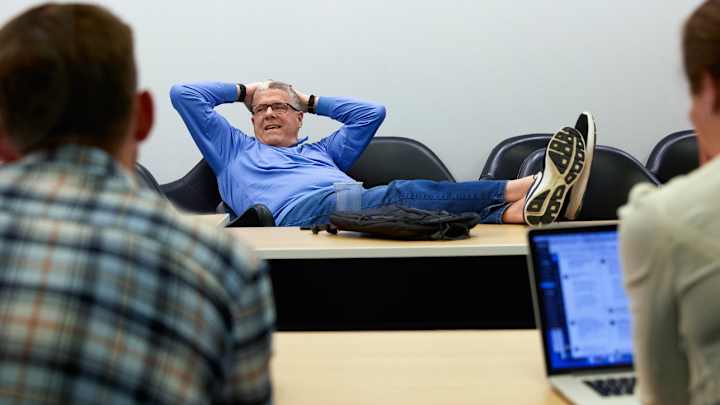
A version of this story appears in the June 4, 2018, edition of Sports Illustrated. To subscribe, click here.
In the spring of 1980, less than a year out of college, Peter King took a job as a cub sports reporter for the Cincinnati Enquirer. Somewhere around that time, King sat down for a headshot, one that, decades later, would bounce around the Internet after King became the face of Sports Illustrated.
In the photo, he’s wearing a plaid shirt, bulky glasses and a massive afro. It’s an awkward picture, to be sure. His expression is part smile and part grimace, as if he can’t wait for this to be over. He has places to go, people to talk to, stories to write. “You can see how eager and enthused he was,” says Mark Purdy, an Enquirer columnist at the time. “What that mug shot says to me is: Let’s Go.”
King went, all right. He spent the next five years at the Enquirer, joining the Bengals beat in 1984. In ’85 he moved to Newsday in New York, covering the Giants. All the while, he was getting inside the game by talking to football’s most prominent figures—Paul Brown, Bill Parcells, Bill Belichick. And he was building a reputation as a go-getter. Parcells, coach of those Giants teams, gave him a nickname: Relentless.
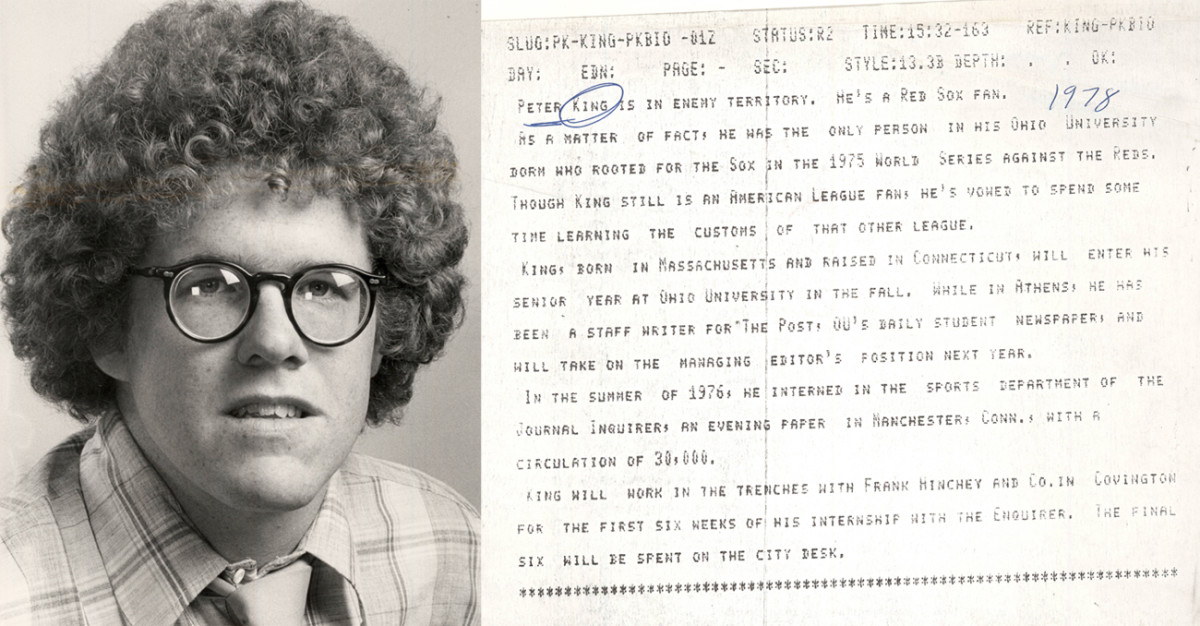
Boomer Esiason, former Bengals quarterback: “Peter picked me up at the airport after I was drafted in 1984. … [This] is how the Bengals do business. They fly you out there coach [class]. They don’t pick you up in a limo. You have to figure out how to get downtown in a cab or whatever. Peter King knew that I was angry because I had fallen in the draft significantly. I thought I was a top-10 player, and I had fallen all the way to number 38, and Peter knew where there was a story.”
Peter King: “Every day that summer [in 1984], it was two-a-day practices, and at least half the days I stood next to Paul Brown. That was such an incredible learning experience—picking the brain of Paul Brown. One day I said to him—we’re in the middle of nowhere Ohio, it’s 89 degrees with 80 percent humidity every day, standing out there for four hours—I just said to him, ‘How do you do this every day? Doesn’t this ever get to you? The tedium or the heat or whatever?’ And he got really angry. He said, ‘Young man, this is our lifeblood!’ ”
Mark Purdy: “You’re around Paul Brown, who was one of the inventors of modern pro football. He invented the facemask, for chrissakes!”
Bill Parcells: “He was eager and very interested in the subject matter. He was a big football fan. Quite interested in the nuances of organizations and how they’re being run. Then the player acquisition and strategic elements of the game. Then, I think more so, he was interested in the personalities of the game, this game for maladjusted people. … You could throw him in that maladjusted category as well.”
Peter King: “Every day I would show up at [Giants] camp at 7:15 a.m. in the coffee room, which doubled as the press room. All the assistant coaches—[offensive coordinator] Ron Erhardt, Belichick [the defensive coordinator], all the coaches—would come through, get coffee, maybe read the Daily News, and then go to work. Parcells would come in and give me these looks and not say anything. By the fourth day he just said to me, ‘Who the [expletive] are you?’ I said, I met you the other day, I’m Peter King, I work for Newsday. And he said, ‘I know that, but what are you doing here [this early]?’ I said, ‘Well, I’m just trying to get my feet on the ground with this job. There’s 19 papers that cover this team every day. I’m a competitive guy and I want to be good at this.’ He just walked out.”
Bill Parcells: “I was a creature of habit, especially if we were winning. I wasn’t tempting fate. So I would go to the same places, and I’d take the same route to the stadium. He would know where I was going to be, and once in a while, he would show up there.”
Bob Glauber, Newsday: “Peter was driven. Parcells nicknamed him ‘Relentless,’ because he was completely fascinated with every aspect of things. He would meet Parcells at his donut shop at 6 in the morning!”
Peter King: “I did that one time. But there were some times where, if I had a question—this happened two or three times. If I felt that it was kind of important or kind of sensitive, I would show up at [Parcells’] parking space at like 6:15, and I would wait, and I would ask him [one question], and then I would go home.”
Bill Parcells: “He knew that I got to work early, and he would show up and be outside the gate at the parking entrance under Giants Stadium. He’d be waiting there.”
Tim Layden, Sports Illustrated senior writer: “The first time I met Peter he was in the press room bunker at the old Giants Stadium, talking on two land line phones at the same time. One in each hand.”
Bob Glauber: “In 1987, Karl Nelson was a right tackle. He was diagnosed with [cancer], and the writers wanted to get some money together to benefit cancer research. So we started a kangaroo court, and we had various fines for our misbehavior. You got fined a dollar for ‘Peter-ing’ if you were on the phone for too long.”
Peter King: “In those days, there weren’t a lot of people who covered the [entire league] as a beat. I had this NFL notes column. … I soon realized I could call the PR guy of the Bears and he would get me Buddy Ryan on the phone.”
Adam Schefter, former Broncos beat writer: “I remember him telling me one time, he said every week he had a goal to call five different people—people he hadn’t spoken to.”
Peter King: “I rode in the car with Parcells after he won the Super Bowl the first time. The game was in Pasadena, at the Rose Bowl. The hotels were far-flung. The Giants were in Orange County, and Parcells had to be at a press conference the next morning at 8:30. He was going to be alone in the car with this security guy for like 20-30 minutes, so I said, It would be great to get a story on this. I asked him [if I could ride along], and he said, ‘I don’t care.’
“He was so excited. The NFL security guy, Charlie Jackson, was driving. I was sitting in the front seat, Parcells was in the back, and Parcells has his elbows up, his forearms on the front seat, and he’s asking, ‘Charlie, was Ditka as excited as I am? Was Ditka this excited last year?’ I mean, he was a kid. He just couldn’t get over it—he had just won the Super Bowl.”
Picking up Esiason at the airport, riding with Parcells after the Super Bowl—King had a knack for taking readers places they’d never been before. Stories like that caught the eye of Sports Illustrated. In June 1989, SI managing editor Mark Mulvoy hired King to bolster the magazine’s NFL coverage, writing a column called Inside the NFL—three to four pages at the back of the magazine, with notes and nuggets from around the league. But his role gradually expanded, as he proved that he could get access to pretty much anyone in the NFL.
Mark Mulvoy: “[When we hired] Ricky Reilly, we brought in from the West Coast and really romanced him over a weekend. He came out to my house in Rye, [N.Y.], and the whole thing. But with Peter, it was really—Peter’s nature at the time was low-key. I remember it being low-key.”
Peter King: “There was not much woo-ing. I don’t think I knew how much money I was going to make when he hired me. I just said yes.”
Mark Mulvoy: “I didn’t think at that time that Peter was the greatest of writers. I don’t say that as a negative. Peter could write, but his real strength was insightful reporting. I think his Rolodex in those days was unmatched. He knew everybody. He knew the owners. He could tell us what the hell was going on in the inner workings of football.”
Rick Telander, former SI writer: “It would be like ‘War and Peace’ compared to a pamphlet—his Rolodex compared to mine.”
Bill Colson, former SI managing editor: “You didn’t read [Peter] for the probing analysis of the human condition like you read Frank Deford or Gary Smith. He was just an unbelievable reporter. He was indefatigable. He just brought you information that you hadn’t seen or read anywhere else before. We didn’t have writers like that.”
Don Banks, former SI.com NFL writer: “He finds absolute joy in being able to get people [on the phone]. He would call you and be absurdly specific. [Peter King voice] ‘You’re never going to believe who I just talked to. I just got Bill Polian on the phone for 47 minutes.’ He could get virtually anybody.”
Brett Favre, Hall of Fame quarterback: “I played 20 years, and I want to say 15 of them, Peter was part of it, to the point where, I want to say, he was just like family. It was not uncommon for Peter to come to town and just come over our house. We welcomed Peter in as if he was family. He took naps right there in the lounge chair in our living room. He’d take his shoes off and he’d have on socks with holes in them. We’d ride to the stadium together, or two nights before the game, we’d go to eat, him and me and my youngest daughter, Breleigh. We’d ride around and tell stories and listen to music.
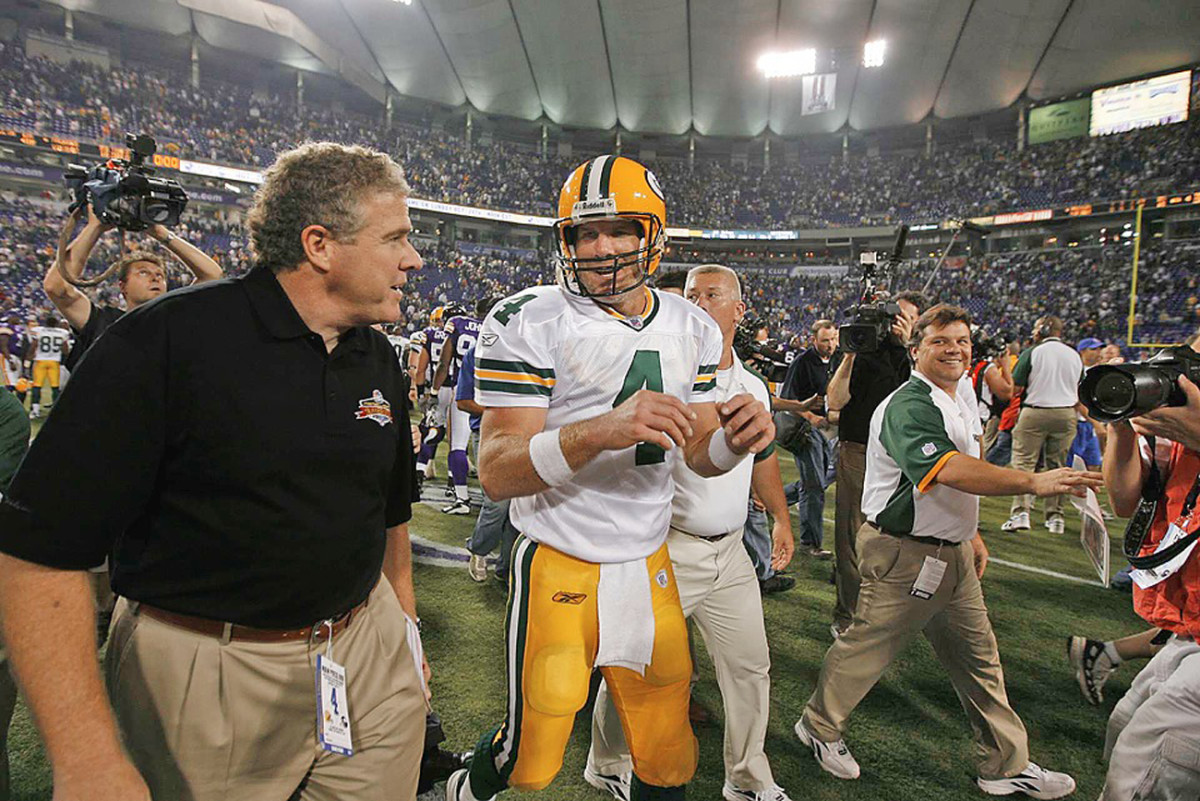
“It was persistence, and I say that kind of jokingly, but it’s kind of true. ‘O.K., Brett, I’m coming to town, do you mind if I come over?’ He was working, and I had a tendency sometimes to forget that. I think that’s what makes a good media person—you almost tend to forget that they’re working. Peter had that way about him.”
Peyton Manning, five-time NFL MVP: “Peter was always very professional. I don’t know if the term off the record exists much anymore, but it certainly did with Peter. You could tell him things off the record, and it would stay that way.”
Boomer Esiason: “Every coach in the NFL would allow him in their office. Every coach in the NFL would allow him in their draft room. Every coach in the NFL would allow him to go out to practice. Why? Because he has the most valuable asset that any reporter could acquire, and that is the absolute unabashed trust from the subject that he is covering.”
Deion Sanders, Hall of Fame cornerback: “I respected him to be one of the generals of his craft, and my attorney, Eugene Parker, adored him, so we established a pretty good relationship early on in my career. He knew my [fake] names that I went under [when I checked into hotels], and that only comes with being consistent and having a relationship and building a trust.”
Brett Favre: “Peter is a very likable person. He’s dry. He’s different than me, but I got Peter. He’s a way smarter guy than I am. He took the top-tier classes, and I was down at the bottom classes. I’m athletic; he really isn’t. He may have been picked last on the playground—and I say that jokingly, too. I may have even had a laugh with him about it: ‘This is your opportunity to get back at all those dumb jocks who picked you last on the playground.’ ”
Steve Young, Hall of Fame quarterback: “Not all writers love the game. They cover it, but they don’t love it. And I think Peter’s love of the game came through. Players felt that. You can feel when somebody cares about the game. The questions are way more interesting and thoughtful when you’re covering something that you really have a passion for.”
Mark Mulvoy: “I always loved the fact that, [imagine] some guy had just scored three touchdowns, he’s on the way to dinner with his wife, and he can’t go to dinner until he’s talked with Peter, because Peter’s calling.”
Sean Payton, Saints coach: “Here’s what I remember all the time. There would be something funny said and he would go, ‘HA HA HA HA.’ And he would give you this four-chuckle laugh that would be a little louder than you wanted in your phone.”
Brett Favre: “There’s no way he can hide in a room of people and you not know he’s there. He does have a very distinct laugh. It’s almost obnoxious—in a good way.”
Peter King: “After John Elway’s last game, I was in a helicopter with him and [coach Mike] Shanahan when they were going from their hotel in Fort Lauderdale to a press conference in Miami the morning after [Super Bowl XXXIII]. You could just tell that Elway, unless something really strange happened, was going to be done. I always tried to get somewhere after a game, with somebody who really mattered. If I could.”

Super Bowl XXIX, 1995, Miami, Florida. The San Francisco 49ers beat the San Diego Chargers in a blowout. Steve Young throws six touchdown passes and is named MVP. King’s job is to trail Young that night and then file his notes to Telander, SI’s lead NFL writer at the time, who is writing the game story for the magazine.
Peter King: “After the game, Leigh Steinberg, his agent, had [Young] do, quite literally, like 20 interviews on the field. I mean, every little mini-cam from San Jose and San Francisco and Sacramento. It lasted about two hours. Steve Young looked at me at one point and he goes, ‘Peter, can you find me anything to drink or eat? I haven’t had anything in like 12 hours.’ So I went underneath the stands, and I saw some guy cleaning up one of the [luxury] boxes. He had a bunch of Gatorades and some cookies, and so I said, ‘I’m sorry, I need this for Steve Young.’ The guy just looked at me very perplexed. I got three bottles of Gatorade and six or eight cookies and I brought them out. Steve Young drank all three Gatorades in about 90 seconds, and then he shoveled down a couple of cookies, and he kept doing interviews.”
Steve Young: “Finally when we were done, I think Peter was the last one standing. I think he just asked, ‘Can I hang with you guys?’ And I said, ‘Of course you can.’ So we got in the limo, and I had drunk so much Gatorade, and I was so hot, I was just sitting there. It was Peter, myself, [draft prospect] Kerry Collins, and Leigh in the back of this limo.”
Peter King: “It was funny—Leigh Steinberg was recruiting Kerry Collins to be one of his clients.”
Steve Young: “By the way, I hate riding in limos in the back. I get carsick. I can’t stand it. So we start driving and all of a sudden I’m like, oh no, this Gatorade is coming out.”
Peter King: “We were barely out of the parking lot of the stadium, and Steve Young unleashes a torrent of bright red vomit all over the back of this thing. It goes all over Steinberg’s shoes, it splashes on my shoes, he gets Kerry Collins a little bit. And Leigh Steinberg, without pausing, says, ‘Well, I’ll never wash these shoes again.’ ”
Steve Young: “I think Peter and Kerry Collins took the brunt of it. And I didn’t mean to, I had an eruption. It’s a hard one, right? What do you do? There’s no good reaction. It’s brutal. I tried to mop it up the best I could.”
Mike Silver: “So Peter files all this stuff to Telander, assuming it’s going to be the lede [of the magazine story], and Telander ends up writing, infamously, a story that was like, ‘To cope with another Super Bowl blowout, you need faith and blah, blah, blah … so I called up Sidedoor Pullman Kid, the King of the Hobos, and wrote a first-person hobo travel story.’ ”
Rick Telander: “I thought about writing something that’s different from all the other Super Bowl stories that had been done. … I actually wrote the story. It was [the hobo] interacting with people at the Super Bowl. I thought it was a good, kind of crazy, odd, but fascinating comparison to a guy who was a genuine hobo and what it’s like for him to be at a Super Bowl, meet the owner of the 49ers and all at.”
Mark Mulvoy: “He wrote about a hobo, and I’m like, what the [expletive] does this have to do with a football game?”
Rick Telander: “I sent the story in, and I think very quickly someone said, ‘Oh, Jesus, what happened here?’ Somebody at the office said, ‘You know, this needs a little rewriting.’ In about two hours I ditched it all and wrote an entire 3,000-word story. I don’t think I’ve ever written that fast in my life. And I used some of Peter’s stuff. God Bless him forever and ever.”
Mike Silver: “Telander had to rewrite on no sleep from his hotel room at 9 in the morning. He ended up using the Steve Young stuff, but only as an ending. So Peter was [expletive] furious. Here he got the greatest Steve Young anecdote ever, and first, it didn’t make the story at all, and then, it wasn’t the lede.”
Peter King: “In those days there was nothing else to do with that stuff. There was no other option to use it anywhere else—no website, no anything. Until I started writing about that a few years later, most of that stuff nobody ever knew.”
In 1997, Steve Robinson, managing editor at CNNSI.com, asked King if he would write a column for the website—just spill his notebook and write whatever he had leftover from his Inside the NFL column and other magazine work. The Steve Young vomit story would never be buried again. Thus Monday Morning Quarterback was born.
Steve Robinson: “A lot of people’s first reaction was, ‘Oh, c’mon, nobody is ever going to read this much.’ But they did! And they do! It wasn’t writerly in the sense of a finished story for the magazine. But that’s not—and it took us a while to get to this point—that’s not what the web is about. It’s not about dotting all the I’s and crossing the T’s and making sure you don’t have any dangling participles or whatever. It’s about creating a recognizable voice that people warm to and go to. Because they have an awful lot of choices.”
Peter King: “We didn’t call it Monday Morning Quarterback in the beginning. I don’t even know what we called it. I don’t remember. What I think I started doing, I would say, ‘Here’s me Monday Morning Quarterbacking what happened this week in the NFL.’ Eventually, probably by the end of that first year, we called it Monday Morning Quarterback, and the name stuck.”
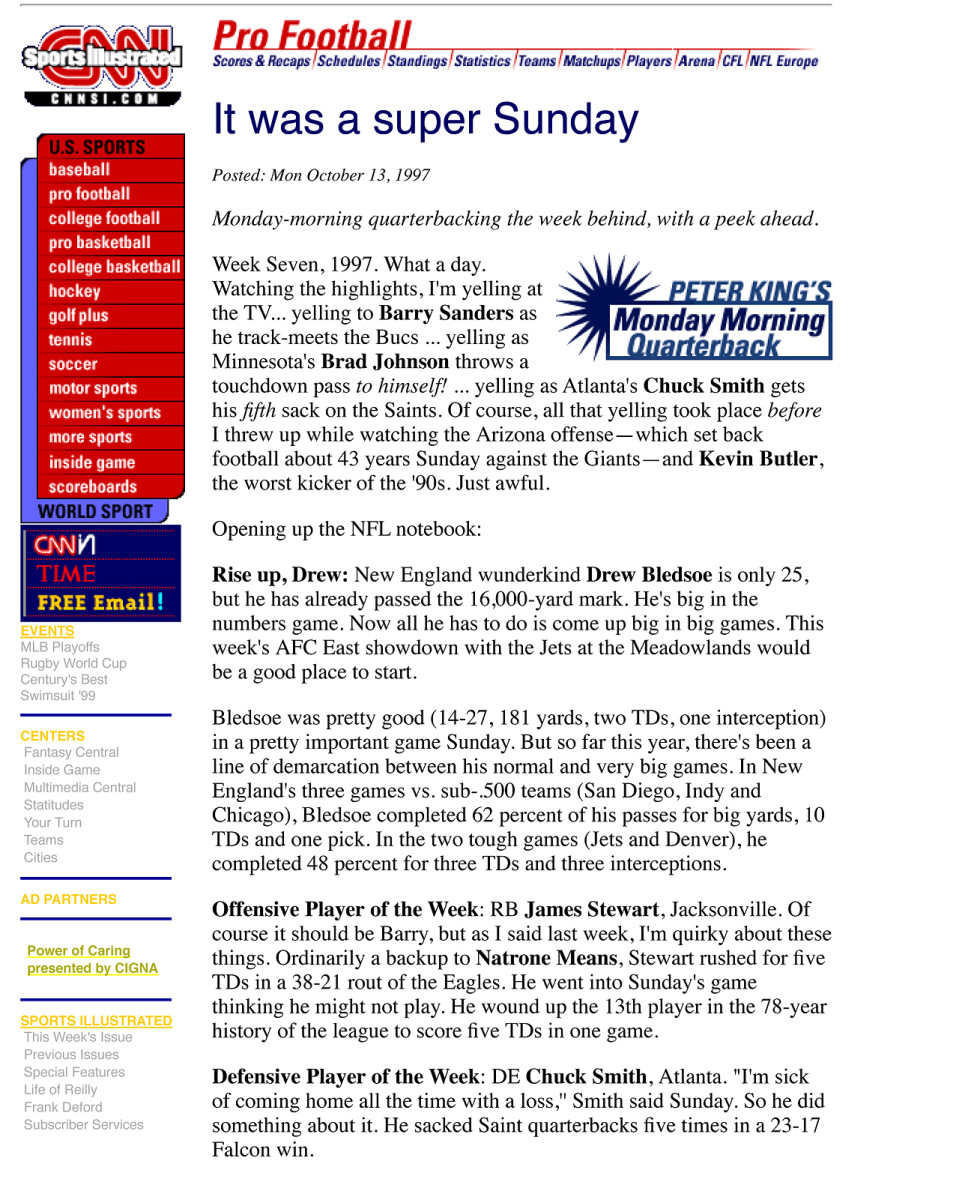
Mike Silver: “Peter gave you: ‘This is the day that was [in the NFL]. This is where we were going in, and after this huge slate of games, this is where we are now.’
Sean Payton: “Growing up as a kid, watching NFL football, we didn’t have access to all the highlights. We got that on Monday night at halftime—Howard Cosell would cover the week in football. When you were younger, it was a school night, so it was: ‘You can stay up for the halftime highlights and then you’re going to bed.’ And then eventually, we had ESPN, and Chris Berman would bring together the week in football. Peter did the same thing in [his column]. He brought you what’s going on in the last week in the NFL.”
Mike Silver: “He also understood the first-person element of the Internet. ‘You know what? I’m going to write about my daughter’s field hockey games. [Expletive] it.’ All the things we were taught not to do at journalism school and Sports Illustrated.”
Steve Robinson: “It was immediately successful. The metric for measuring page views and all of that took a while to mature. It was a time when we were doing a lot of guesswork, but it was clear that people were going to it. They knew it was going to be there, and it was a consistent voice.”
Peyton Manning: “He would take these training camp tours every summer. He’d go see a number of training camps, and then he would come to Indianapolis or he would come to Denver, and he and I would go sit on a golf cart or on a bench somewhere. After he interviewed me about how camp was going or that season’s expectations, it would be my turn to interview him about all the places he’d been. He wasn’t revealing any private information, but it was a great way for me to keep up with all that was going on around the league.”
Frank Reich, former NFL quarterback, now Colts coach: “Over the years there were very few things as a player and as a coach that I would read, just because of time. You just don’t have enough time to read as much as you want to read. But I would always read Monday Morning Quarterback. It just had a style of writing that was unique and informative and entertaining. I loved the 10 Things I Think I Think section. If I didn’t have time to read anything, I was going to read that.”
Adam Schefter: “I can’t tell you how many times I’m reading the column and I’m going, ‘Goddam, he’s out in front on this.’ Or, ‘He knew this, detailed explanation on that.’ ”
Mike Florio, founder, Pro Football Talk: “I don’t know how you can [write that column] for 17 straight weeks in season, for all the information that comes out of the games. To have a sense of what’s interesting, to talk to the right people, to take it all and distill it into 8,000 words that are mostly written on the fly? It really is an impressive task. I know I could never do it.”
As the column took off, King’s profile grew. In 2009 he received the Dick McCann Memorial Award from the Pro Football Writers of America, joining the “writers wing” of the Hall of Fame, and in 2010 he was named Sportswriter of the Year by the National Sports Media Association.
Readers naturally gravitated to King when there was a big story, and in those instances, in classic Peter King fashion, he would try to take them behind the scenes as much as possible. In some cases critics said King was too close to his subjects, or too close to the league office. Sean Payton didn’t talk to him for about four years after Bountygate.
Mike Florio: “There’s a certain balance that you have to strike if you want to have true access. If you want to be in a position where you can get this coach on the phone, that GM on the phone, that owner on the phone, you have to have a willingness to … I don’t necessarily want to say ‘compromise,’ because I don’t mean it in a pejorative way, but you have to know how to rein in how far you’re willing to go to criticize someone actively in the sport that you’re covering. Otherwise, they’re going to tell you to go to hell when you try to get them on the phone.
“I think Peter balances that as well as anyone, because he still is critical. There are people who won’t talk to him, so it’s not like he’s walking around shaking pom-poms solely for the purpose of getting access. I think he’s critical fairly when he needs to be. Some people get it, and they’re willing to talk to him, even though from time to time he speaks his mind. Then some people have a problem with it.”
King offered to resign during both the Ray Rice and the Deflategate scandals, because he had been wrong on parts of his reporting—due in part, he says, to sources giving him faulty information.
Chris Stone, Editor in Chief, Sports Illustrated Group: “We all make mistakes. We’ve made much bigger mistakes than that [at SI]. He owned it. To this day it clearly still haunts him. And I think that speaks more highly of Peter than it does less of him.”
Peter King: “I honestly feel like if anybody at SI said we don’t trust your reporting on this anymore, I would just say, O.K., I should go.”
Mike Florio: “Bill Belichick won’t talk to him. I think Belichick is still mad at him about Spygate from 2007. At some point that’s Bill’s problem, not Peter’s problem.”
Adam Schefter: “There’s no part of me that says, ‘Oh, Peter has gone soft on the league.’ Peter is a lover of football and of people. He also has a sharp tongue. There were times last year when I’m reading his column—you can look these things up. Search, ‘Ben McAdoo.’ I’m like, did he really just write this about Ben McAdoo?”
Mike Silver: “I just think, if you try to do something on the scale that he did—which is wrap your arms around the league and its history and its legacy, every week—you’re going to have people think you’ve become this, or you didn’t do this well enough, or you should’ve been more true to this. I just hope that none of that [criticism] lasts. He did something momentous and novel and uncharted, and he did it at an insanely high level and he almost never stopped.”
Deion Sanders: “When you’ve been in the game that long, people tend to feel like, when you say something, it’s the gospel. It’s the good news. Because you’ve been vetted, you’ve stood the test of time, and you’re still respected from all ethnicities, and not just one. He put in his work, man.”
Peter King: “At the 2017 league meetings, we’re in Phoenix, and I pass [Sean Payton]. I see him, we stop and say hello. We had like a 15 minute conversation, and I said, ‘Hey, I’ll call you one day,’ and he says, ‘I’d like that.’ ”
Sean Payton: “I consider him a good friend. We went through a stretch during [Bountygate] when he probably still was a good friend, but one that I wasn’t speaking with.”
By 2013, King had established himself as one of the pre-eminent football writers in the country—and was ready for something new. Paul Fichtenbaum, Time Inc. Sports Group editor at the time, offered to build a website around him, dedicated to football 24/7: The MMQB. King could hire a team of reporters and editors, direct the coverage and be in complete control.
Dom Bonvissuto, longtime editor of Peter’s Monday column: “At the time he started The MMQB website he was 56-ish. He had many opportunities to just kick back, maybe write the column once a week, maybe do a little TV work. He could’ve just kicked his feet up. And when he decided to do The MMQB, it was the complete opposite decision. He said, not only am I not going to kick my feet up and coast into retirement, he said, I want to become a boss, I want to hire all these writers.”
Paul Fichtenbaum: “He had been doing the same thing for many, many years, and he wanted to creatively challenge himself. It was important for him to do something that was different and new, that he could shape.”
Ed Werder, longtime NFL reporter: “At first I was a little disappointed. I thought it was something I might like to get involved in, and he pretty much told me right away that he wasn’t hiring all of his friends, that he had a different vision for it. He was going to use it to create opportunities for journalists he thought deserved a bigger platform.”
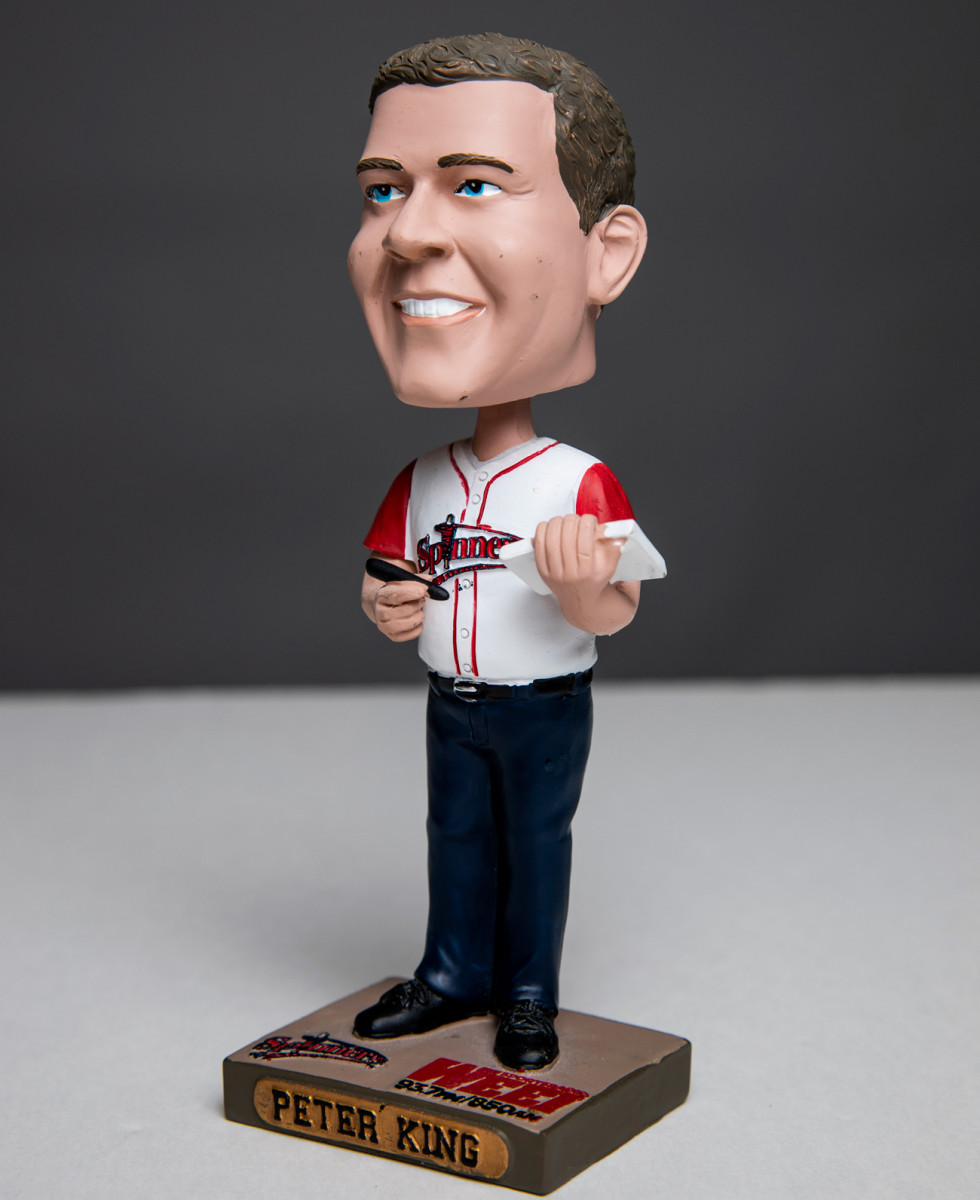
Chris Stone: “He had the idea, if we’re going to build something truly different, maybe we need to think about bringing in some truly different voices.”
Jenny Vrentas, senior writer, Sports Illustrated/The MMQB: “When Peter started The MMQB in the spring of 2013, the first thing we did together as a staff was an off-site retreat. We were given one assignment by Peter going in: Brainstorm 10 ideas that no one has ever done before. That’s a daunting task, given the fact that no sport in America is covered as thoroughly as the NFL. But that was Peter’s vision for The MMQB: to be different.
“On the flight home from that off-site retreat, Peter told me how important it was to him to have more women and more people of color on staff. You could take that two ways. No one wants to be hired because of their gender or race. But that’s not what Peter was saying. He was saying that he was a white male, working in a predominantly white and male industry, and once he got the chance to hire a staff, he wanted to change that.”
Dom Bonvissuto: “The website exposed the football world to a whole new generation of talent, and that wouldn’t have been possible without Peter.”
King is leaving Sports Illustrated now on June 1—29 years to the day since Mulvoy hired him. He turns 61 this month, and wants to cut back on his work, spend more time with his family and step aside, he says, so the young writers he hired at The MMQB can flourish without him casting a shadow. He plans to continue writing his column with NBC Sports.
Mark Purdy: “What percentage of Peter’s life do you think he spent on his cell phone?”
Mark Mulvoy: “At Sports Illustrated in the ’70s, Dan Jenkins was the marquee talent. And then you had Deford in his prime. I’m sure I’m missing somebody in there. Then Reilly, you had his column at the back of the magazine. He was the face of SI. But clearly, since the turn of the century, it’s been Peter with his MMQB column. You’re talking about a guy, for 15 years or so, he’s been the face [of Sports Illustrated].”
Chris Stone: “I really believe he is one of the five most important figures in SI history. Peter almost alone kind of ushered Sports Illustrated into the digital era with his willingness to embrace digital. He didn’t just say, ‘I’m going to be part of the Internet.’ He created something that was an Internet media phenomenon.”
Deion Sanders: “He created a brand. He did a lot for SI. I’m proud of him. He had a good run. It’s not like he’s leaving the game yet. He’s only leaving SI.”
Adam Schefter: “Peter would be on the Mount Rushmore of football writers.”
Peyton Manning: “When you think of Sports Illustrated, you think of Peter King. I know I do. It’ll be hard to not see Peter King and Sports Illustrated tied in one.”
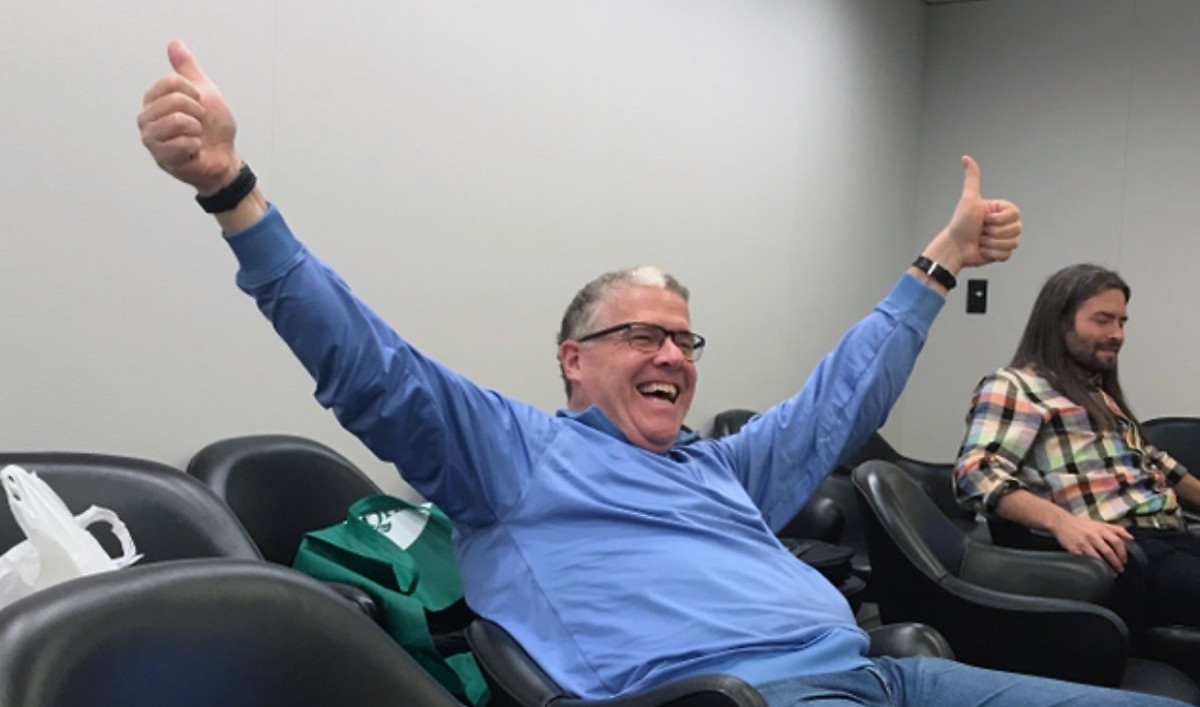
Question or comment? Email us at talkback.com.
